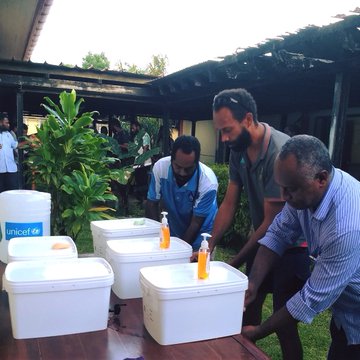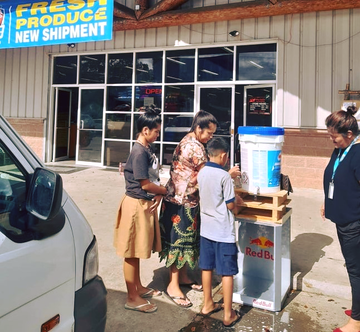UN helps Pacific prepare for COVID-19 pandemic, warns that children are ‘hidden victims’

United Nations agencies are working together to provide vital support to Pacific Island countries as they rally to combat COVID-19 outbreaks across the region.
The UN Children’s Fund (UNICEF) and the World Health Organization (WHO) have been busy providing vital supplies to Pacific Island governments, including more than 170,000 essential medical and laboratory items.
“UNICEF will continue working with governments and our partners throughout the Pacific to stop transmission of the virus, and to keep children and their families safe”, said UNICEF Pacific Representative, Sheldon Yett.
Assistance has been delivered according to their current needs, along with communication materials to inform the public about the symptoms of COVID-19, how to treat someone feeling unwell and preventative actions to stem the spread of the virus.
Led by WHO and partners, UNICEF is supporting the COVID-19 Joint Incident Management Team response in the Pacific, along with the Australian Department of Foreign Affairs and Trade, New Zealand Ministry of Foreign Affairs and Trade, Government of Japan and Global Partnership for Education.
‘Hidden victims’
Pointing out that in just a few months, COVID-19 has “upended the lives of children around the Pacific” along with most other regions of the world, Mr. Yett stressed that they are the “hidden victims of this pandemic”.
The UNICEF envoy painted a grim picture of closed borders, parents and caregivers losing their jobs and “thousands of children” out of school.
Coronavirus Portal & News Updates
Readers can find information and guidance on the outbreak of the novel coronavirus (2019-nCoV) from the UN, World Health Organization and UN agencies here.For daily news updates from UN News, click here.
To mitigate the consequences, the gency is supporting all countries in the region by adapting the UN?? Guidance for COVID-19 Prevention and Control in Schools for Pacific Island countries, to keep schools safe and help children continue their learning when schools are closed.
On the ground support
UNICEF is also providing medical items across the Pacific, including N95 respirators, surgical masks, swabs, thermometers, testing kits, gloves and medical gowns.
In addition to providing medical and laboratory supplies to support governments in responding to virus outbreaks, UNICEF continues to reach out to communities to share crucial information on keeping children safe and on preventing the spread of COVID-19, such as washing hands, coughing into elbows and not touching faces, especially eyes, mouth and nose.
UNICEF action at the country level
- Fiji: Provided tents to be used as fever clinics to treat patients.
- Micronesia: Implemented community hand washing campaign and is working with partners to build 100 handwashing stations as part of a hygiene promotion campaign.
- Solomon Islands: Distributed Water, Sanitation and Health dignity kits and developing training for Social Welfare officers on managing stress and self-care during the pandemic.
- Vanuatu: Provided tents to treat patients and traiing, for community awareness outreach.
- Kiribati: Developed SMS platform for COVID-19 text messaging, installed handwashing facilities at two hospitals and launched a community campaign on proper hand washing.
- Courtesy:UN Mews




Comments